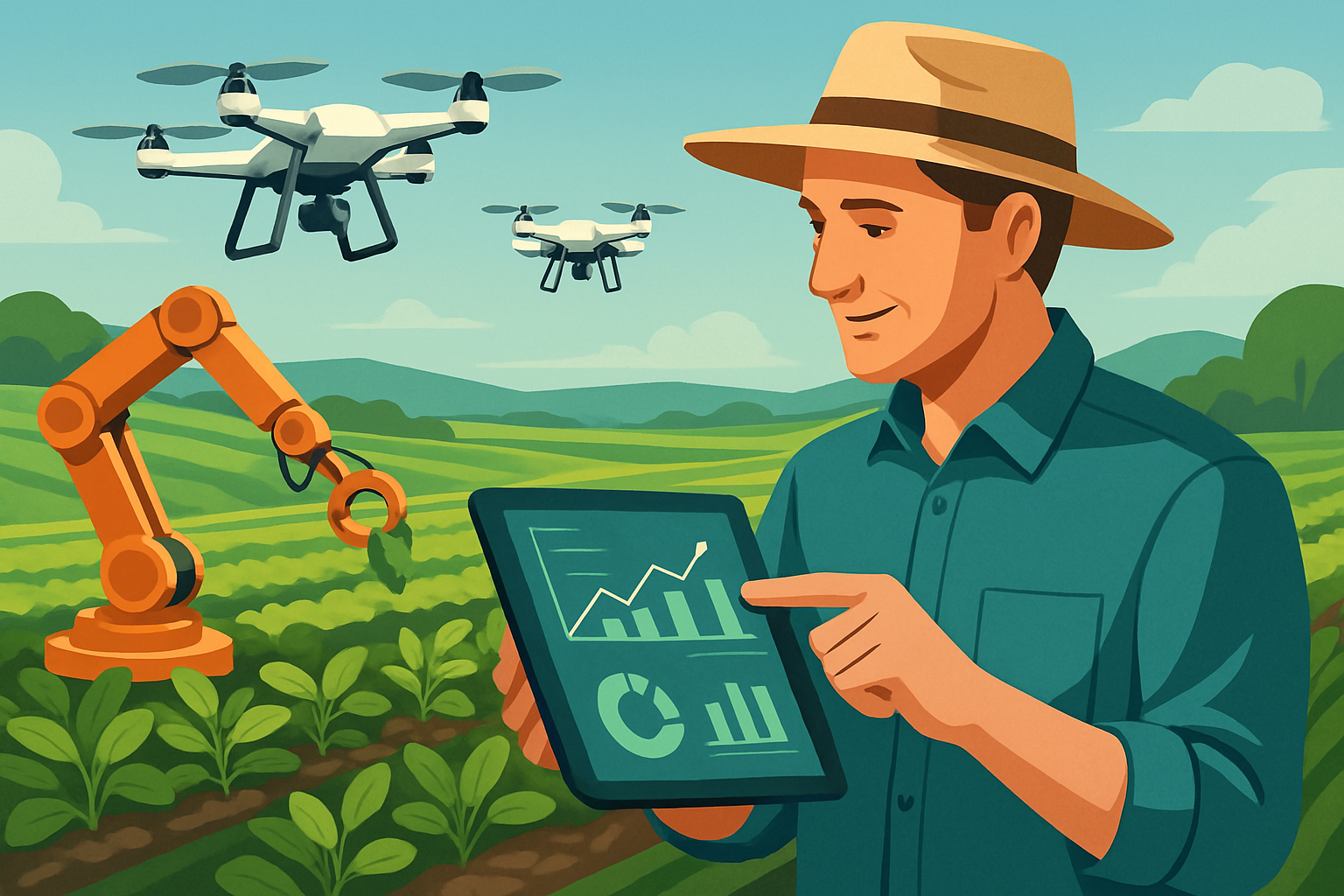
AI in Agriculture (AgriTech): Smart Farming for a Sustainable Future
Introduction: Revolutionizing Agriculture to Meet Global Demands
The global population is projected to reach nearly 10 billion by 2050, presenting an immense challenge to current food production systems. Traditional farming methods are increasingly strained by climate change, resource scarcity, and the need for greater efficiency. Artificial Intelligence (AI) is emerging as a transformative force in agriculture (AgriTech), offering innovative solutions to enhance productivity, optimize resource use, and promote sustainability. From precision agriculture and automated machinery to intelligent crop monitoring and supply chain optimization, AI is empowering farmers to make data-driven decisions and cultivate a more resilient and efficient food future. This article will explore the diverse applications of AI in AgriTech, highlighting how smart farming technologies are paving the way for a sustainable agricultural sector, and will identify potential affiliate opportunities for relevant AgriTech solutions.
Precision Agriculture with AI: Optimizing Resources, Maximizing Yields
Precision agriculture involves using technology to observe, measure, and respond to intra-field variability in crops. AI takes this a step further by analyzing complex data to enable highly targeted interventions.
- AI-Powered Analytics: AI algorithms process data from various sources, including drones, satellites, on-ground sensors (measuring soil moisture, nutrient levels, weather conditions), and GPS technology.
- Optimized Resource Use: This data-driven approach allows for precise application of water, fertilizers, and pesticides only where and when needed. This minimizes waste, reduces environmental impact, and lowers costs for farmers.
- Variable Rate Technology (VRT): AI integrates with VRT-equipped machinery to automatically adjust application rates of inputs across a field based on real-time analysis.
AI for Advanced Crop and Soil Monitoring
Continuous and accurate monitoring of crop health and soil conditions is vital for timely interventions and maximizing yields. AI provides powerful tools for this purpose.
- Disease and Pest Detection: AI-powered computer vision systems, often deployed on drones or ground robots, can identify early signs of diseases or pest infestations by analyzing images of plants. Early detection allows for targeted treatment, preventing widespread outbreaks.
- (Potential Affiliate Opportunity: Platforms like Plantix or solutions from companies like Prospera, if they offer affiliate programs for their diagnostic tools or B2B AgriTech solutions.)
- Soil Health Analysis: AI can analyze sensor data and historical information to assess soil composition, nutrient deficiencies, and overall health, guiding farmers on appropriate soil management practices.
- Yield Prediction: By analyzing historical data, weather patterns, and current crop health, AI models can predict crop yields with increasing accuracy, helping farmers with planning and market decisions.
AI-Powered Robotics in Farming: Automating Labor-Intensive Tasks
Labor shortages and the physically demanding nature of farm work are significant challenges in agriculture. AI-driven robotics offers solutions to automate various tasks.
- Automated Harvesting: Robots equipped with AI and computer vision can identify and selectively harvest ripe fruits and vegetables, often working around the clock and with greater precision than manual labor.
- Autonomous Weeding and Thinning: AI-guided robots can distinguish between crops and weeds, applying targeted micro-doses of herbicides or using mechanical methods to remove weeds, reducing reliance on broad-acre spraying.
- Smart Seeding and Planting: AI can optimize planting patterns and depths based on soil conditions and topography for better crop establishment.
AI for Intelligent Livestock Management
AI is also making significant inroads into livestock farming, improving animal health, welfare, and productivity.
- Health Monitoring: Wearable sensors and AI analytics can monitor individual animal vital signs, activity levels, and behavior to detect early signs of illness, allowing for prompt veterinary intervention.
- Behavior Analysis: AI can analyze video footage or sensor data to understand animal behavior, identify stress factors, and optimize housing conditions or feeding strategies.
- Optimizing Breeding: AI can analyze genetic data and performance metrics to assist in making more informed breeding decisions for improved herd genetics.
AI in Supply Chain Optimization for Agriculture
Beyond the farm gate, AI is helping to create more efficient and transparent agricultural supply chains.
- Demand Forecasting: AI can analyze market trends, weather patterns, and consumer behavior to predict demand for agricultural products, helping to reduce overproduction and waste.
- Food Traceability: AI, often in conjunction with blockchain technology, can improve the traceability of food products from farm to consumer, enhancing food safety and building consumer trust.
- Logistics Optimization: AI can optimize transportation routes and storage conditions to minimize spoilage and reduce the carbon footprint of food distribution.
Challenges in Adopting AI in Agriculture
Despite the immense potential, the widespread adoption of AI in agriculture faces several hurdles:
- Data Accessibility and Quality: AI models require large amounts of high-quality data, which can be challenging to collect and manage, especially for smaller farms.
- Cost of Technology: The initial investment in AI-powered tools and machinery can be prohibitive for many farmers, particularly in developing regions.
- Connectivity in Rural Areas: Reliable internet access is crucial for many AgriTech solutions, but connectivity can be limited in remote agricultural areas.
- Skills and Training: Farmers and agricultural workers need training to effectively use and manage AI-based systems.
Conclusion: AI – A Key Driver for a Sustainable Agricultural Future
Artificial Intelligence is poised to play a pivotal role in transforming agriculture into a more efficient, productive, and sustainable sector. By enabling precision farming, automating labor, enhancing monitoring capabilities, and optimizing supply chains, AgriTech solutions are helping to address the critical challenges of feeding a growing global population while minimizing environmental impact. While challenges in adoption exist, ongoing innovation, decreasing costs, and increasing awareness are driving the integration of AI into farming practices worldwide. For businesses and individuals in the agricultural technology space, exploring and promoting AI-driven solutions, potentially through affiliate partnerships with AgriTech companies, offers a pathway to contribute to this vital transformation and cultivate a smarter, more sustainable future for agriculture.

Leave a Reply